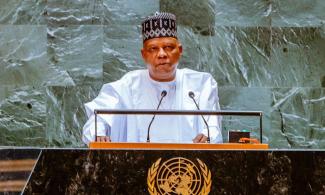
This was stated in a speech delivered on Tuesday by the country’s Vice President, Kashim Shettima at the 79th session of the United Nations General Assembly in New York, US.
The Nigerian government has reiterated its commitment to the Palestinian people's right to independence, emphasising its unwavering support for a two-state solution in the ongoing Israel-Palestine conflict.
This was stated in a speech delivered on Tuesday by the country’s Vice President, Kashim Shettima at the 79th session of the United Nations General Assembly in New York, US.
He said: “Freedom is an inalienable right and a natural entitlement that cannot be denied to any people. The Palestinian people deserve their independence.
“They deserve to have a home of their own on territories already recognised by this very Assembly and by international law, which is being routinely ignored.
“Nigeria continues to urge efforts to bring back on track the ‘two state solution’ that offers the prospect for a new beginning for the region.
“Nigeria reaffirms its commitment to supporting United Nations Peacekeeping Operations. We recognise the need for Africa to build strong and professional armies to meet the multiple challenges we face.
“Consequently, we reiterate the call for international support to operationalise the African Standby Force, in addition to the provision of requisite support and resources to ensure the upgrade, take-off and effectiveness of a Centre of Excellence on issues of counter-terrorism in Africa.”
Shettima, therefore, urged the leaders of the United Nations to take their statutory duty of war prevention globally more seriously for human rights protections and preservation of lives.
He continued: “Conflict prevention is the main reason why the UN exists. But the task of prevention becomes all the more difficult when conflict becomes normalised, when even the condemnation of violence and civilian casualties, and calls for a ceasefire, are somehow regarded as controversial.
“As we emphasised at the Abuja High-Level Ministerial meeting, we must renew our focus on conflict prevention. Indeed, addressing the root causes of conflicts is often the first step towards providing long-term solutions.
“Clearly, some of the root causes of conflicts are social in nature, including poverty, hunger, ignorance, inequality and exclusion, as well as other forms of injustice.
“In Sudan, other parts of our continent and further afield, foreign actors are exacerbating those tensions to prolong conflict and deepen the suffering of innocent people.
“Today, we are all witnesses to the heart-wrenching situation in Gaza and other Palestinian Territories. We cannot discuss war and peace, conflicts and reconciliation or humanitarian imperatives today without reflecting on the Israeli-Palestinian conflict that has been raging since 7th October last year.”